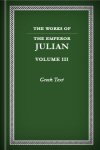The Works of the Emperor Julian (6 vols.)
Digital Logos Edition
This product has been transferred from Community Pricing to Pre-Pub. The actual funding level may be lower than it appears, which could delay production. The amount of funding still needed will be evaluated and updated soon.
Overview
In spite of several significant military accomplishments, Emperor Julian was a student first. Educated by the best teachers of his time, Julian the Philosopher wrote powerful orations, letters, and essays—some of which he composed in camps during military campaigns. As a leader, Julian was so influential that his men declared him Augustus, a title reserved for emperors, while Constantius II still reigned as the rightful ruler. Only the sudden death of Constantius prevented civil war.
Included in The Works of the Emperor Julian are his extant works, translated by Wilmer Cave Wright. These writings illuminate Julian’s sophist philosophies and pagan beliefs, offering a unique perspective on his reign as one of the world’s most powerful men. The writings of this politically and philosophically intelligent general have value for the student of history, Greek, anthropology, philosophy, or literature.
This collection contains the complete texts in their Loeb Classical Library editions. Each volume is included in its original Greek with an English translation for easy side-by-side comparison. Logos’ language tools help you to go deeper into the Greek text and explore each poet’s elegant language. Use the dictionary lookup tool to examine difficult Greek words and find every appearance of the same word in your library. There’s never been a better way for students of history, culture, and Latin literature to absorb these works.
- Orations, letters, and essays by Julian the Philosopher
- A critique of Christianity from a pagan perspective
- Loeb Classical Library editions
- Title: The Works of the Emperor Julian
- Author: Flavius Claudius Julianus
- Editors: E. Capps, T. E. Page, and W. H. D. Rouse
- Translator: Wilmer Cave Wright
- Series: Loeb Classical Library
- Publisher: Macmillan Co. and G. P. Putnam’s Sons
- Volumes: 6
- Pages: 1,478

This volume contains Wilmer Cave Wright’s English translation of five orations by Julian, including two hymns, two panegyrics, and a praise of Emperor Constantius.

This volume contains the Greek text of five orations by Julian, including two hymns, two panegyrics, and a praise of Emperor Constantius.

The Works of the Emperor Julian, vol. 2
- Author: Flavius Claudius Julianus
- Editors: T. E. Page and W. H. D. Rouse
- Translator: Wilmer Cave Wright
- Series: Loeb Classical Library
- Publisher: Macmillan Co.
- Publication Date: 1913
- Pages: 260
This volume contains Wilmer Cave Wright’s English translation of orations, letters and essays by Julian, including an oration he wrote when Constantius removed his primary advisor, Sallust.

The Works of the Emperor Julian, vol. 2: Greek Text
- Author: Flavius Claudius Julianus
- Editors: T. E. Page and W. H. D. Rouse
- Translator: Wilmer Cave Wright
- Series: Loeb Classical Library
- Publisher: Macmillan Co.
- Publication Date: 1913
- Pages: 259
This volume contains the Greek text of orations, letters and essays by Julian, including an oration he wrote when Constantius removed his primary advisor, Sallust.

The Works of the Emperor Julian, vol. 3
- Author: Flavius Claudius Julianus
- Editors: E. Capps, T. E. Page, and W. H. D. Rouse
- Translator: Wilmer Cave Wright
- Series: Loeb Classical Library
- Publisher: G. P. Putnam’s Sons
- Publication Date: 1923
- Pages: 224
This volume contains Wilmer Cave Wright’s English translation of the remaining works of Julian, including “Against the Galilaeans,” which seeks to disprove Christianity and ultimately promote Julian’s own pagan beliefs.

The Works of the Emperor Julian, vol. 3: Greek Text
- Author: Flavius Claudius Julianus
- Editors: E. Capps, T. E. Page, and W. H. D. Rouse
- Translator: Wilmer Cave Wright
- Series: Loeb Classical Library
- Publisher: G. P. Putnam’s Sons
- Publication Date: 1923
- Pages: 224
This volume contains the Grek text of the remaining works of Julian, including “Against the Galilaeans,” which seeks to disprove Christianity and ultimately promote Julian’s own pagan beliefs.
Flavius Claudius Julianus (ca. AD 331–363), also known as Julian the Apostate and Julian the Philosopher, was the last pagan Roman emperor, and the last emperor of the Constantinian dynasty. He was a military commander, theosophist, social reformer, and scholar. Julian was constantly learning and writing, even on his military campaigns. His success as a military leader inspired his troops to call him Augustus before he came to power as emperor, causing conflict with the rightful emperor, Constantius II. Constantius died before the conflict escalated to civil war, but not before naming Julian as his heir. During his brief reign as emperor, Julian reinstated Hellenistic polytheism as the state religion, earning him the title Julian the Apostate among Christians. He died of a wound he received in battle with Sassanid forces.
Reviews
0 ratings
Oldnewbie
5/28/2016
If you are interested in ancient Christianity, church history, western history or studies in paganism this set seems to be a natural. One of his letters came up in the Mobile Ed CH101 course for church history. Since I'm interested in all of the above I already bid. Only $15 for the original text of his works and the English translations? 'Excellent' is the word that comes to mind.